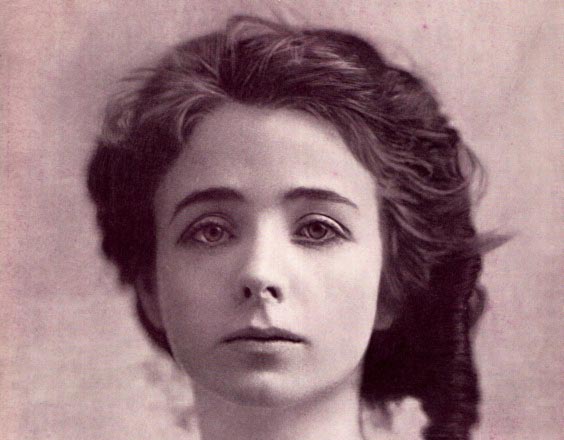
Did you know that Salt Lake City was the birthplace of one of America’s first leading actresses? Occasionally, while traipsing through old western towns, I’ve run across pictures, news articles, and even tour guides, proclaiming the glories of the great Maude Adams. Let me tell you a little about her.
Maude Kiskadden was born in Salt Lake City (7th East and 8th South, to be exact), on November 11th, 1872. Her grandfather, Barnabas L. Adams, was part of the exodus from Nauvoo, having met LDS missionaries in Canada, arriving in the Salt Lake Valley in 1848. Her mother, Asenath Ann (Annie) Adams, was born near Little Cottonwood canyon. Annie was also an actress.
Annie Adams was known as one of the best actresses in Salt Lake City. But it would be Maude Adams who would achieve greatness among all the American actresses of her day. Annie, and a generation later, Maude, would act in the Salt Lake Theater. Timber, from Barnabas’ saw mill, was used to build many well-known structures in the city, including this building, interestingly enough.
Annie traveled with a company of actors, eventually settling in California. Maude, as a little girl, would sometimes appear on stage, if an infant was needed to fill a role.
In fact, her very first role was her playing the part of roast beef on a platter. As she waited back stage in a cradle, her mother was performing in a play called The Lost Child. “One scene called for a platter to be carried on-stage with a sleeping child in place of a roast, but, at the time of the cue, the regular baby was having a noisy tantrum. Annie, waiting in the wings, offered her nine-month old offspring as a stand-in. Maude was placed on the platter and carried in, but, rather than stay asleep, she sat up and looked around in fascination and her first triumph in front of the footlights was accomplished.”
Maude’s father, James Kiskadden, passed away when she was still quite young, so she would divide her time between her traveling mother, and her grandmother, who still resided in Salt Lake City. At age sixteen, Maude left Salt Lake for the lights of New York, where she was cast into more and more prominent roles. By the late 1890’s she was a star. As Maude set out to make a name for herself, she chose her mother’s maiden name as a more fitting name to be known by.
 “Richard Matheson was inspired to write “Bid Time Return” (original story made into the movie Somewhere In Time) after being mesmerized by the portrait of famous actress, Maude Adams, hanging in the Opera House in Virginia City, Nevada during a trip. When he researched her, he found some interesting and mysterious facts about her reclusive life, and wondered what may have occurred in her life, thus the idea for his novel was born.”
“Richard Matheson was inspired to write “Bid Time Return” (original story made into the movie Somewhere In Time) after being mesmerized by the portrait of famous actress, Maude Adams, hanging in the Opera House in Virginia City, Nevada during a trip. When he researched her, he found some interesting and mysterious facts about her reclusive life, and wondered what may have occurred in her life, thus the idea for his novel was born.”
Never forgetting her roots, Maude arranged for the complimentary seating of the entire Mormon Tabernacle Choir, while they were touring in New York, for her performance of Peter Pan. This was in the year 1909. At the end of the performance, the Choir stood and sang “Auld Lang Syne”, in her honor, and the whole audience joined in.
Maude Adams never married. Rather, she was married to the stage. After an amazing career, she retired from acting in 1918. She began staging and directing, which became her true passion. Finally, in 1931, she staged and acted in her final performance in The Merchant of Venice at Kingsbury Hall on the University of Utah campus. She died at her home in the Catskill Mountains of New York on July 16, 1953.
Information taken from:
Relief Society Magazine, 1890, p. 244
Utah Historical Quarterly, Winter 1970, p. 65
Somewhere In Time trivia
More on Maude Adams has been discovered over the years, including her longtime female lovers, the last of whom she was buried near. Her careful selection of roles in “breeches productions” in which she cross-dressed helped crack open our perceptions of what a woman can be and arguably helped seed the theater, and the country, with the what would be come the gay liberation movement. Here’s a recent Beehive Archive on Maude that just aired on KCPW in Salt Lake.
http://www.utahhumanities.org/stories/items/show/353
Remarkable talented beauties from the past that almost no one today has ever heard of. Sorta Sad.